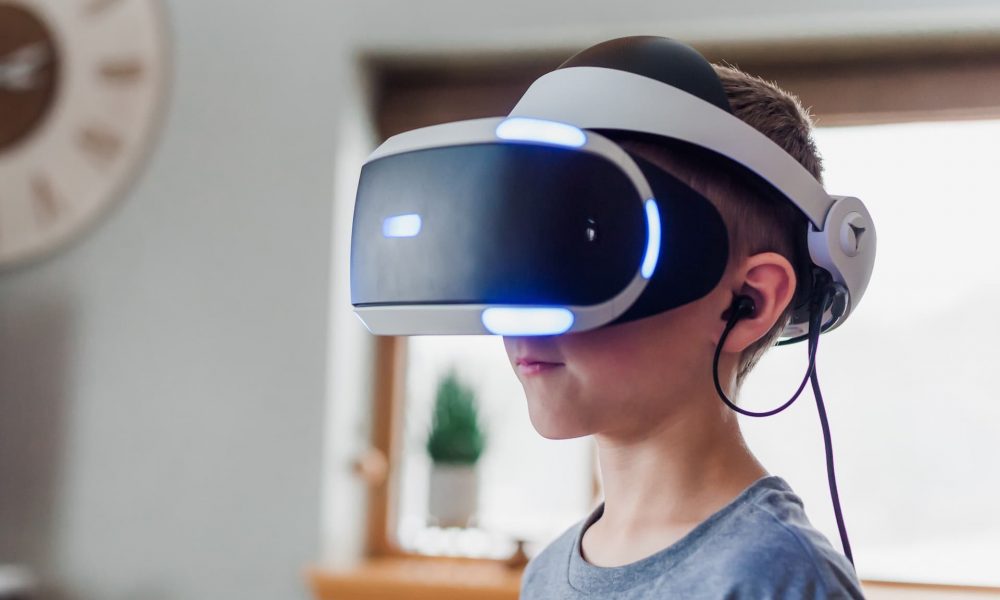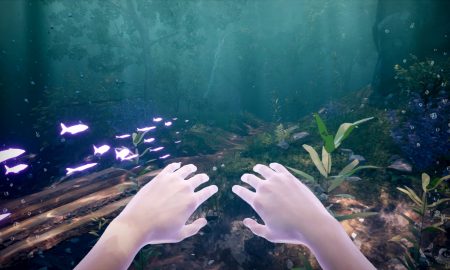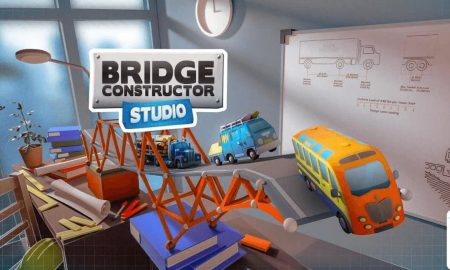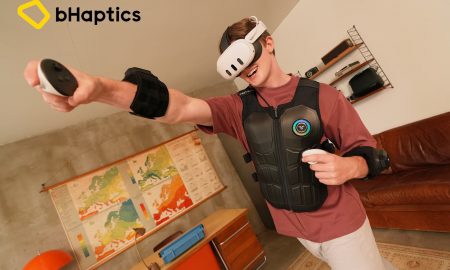

In today’s fast-paced digital age, education is undergoing a significant transformation. One of the most exciting developments is the integration of Virtual Reality (VR) in the classroom. This cutting-edge technology is not only changing the way students learn but also how teachers engage with them. Let’s look at how VR is changing how teachers connect with students. We will also see how VR game developers are helping this change.
The Rise of Virtual Reality in Education
Virtual Reality has moved beyond the realm of gaming and entertainment to become a powerful educational tool. By creating immersive learning experiences, VR captures students’ attention and makes learning more interactive and fun. This shift from traditional teaching methods to VR-based learning environments is making a significant impact.
Immersive Learning Environments
VR provides a unique way to create immersive learning environments that engage students like never before. These environments simulate real-world scenarios, allowing students to learn by doing. For example, students can learn about ancient civilizations or practice languages in a virtual space. This makes learning more real and memorable. This kind of active participation can spark curiosity and encourage students to delve deeper into subjects.
Overcoming Traditional Barriers
Traditional classroom settings often face barriers such as limited resources or geographical constraints. VR eliminates these barriers by providing a platform where students can access a wide array of experiences. Whether it’s visiting a museum on another continent or observing natural phenomena, VR makes these experiences accessible to all students, regardless of location. This democratization of learning resources is a game-changer in education.

Personalizing Education
One of the most significant advantages of VR in education is its ability to personalize learning. VR can adapt to the pace and learning style of each student, offering customized experiences that cater to individual needs. For example, struggling students can revisit complex topics through interactive simulations, while advanced learners can explore more challenging material. This personalized approach ensures that all students can achieve their full potential.
Benefits of VR in the Classroom
- Enhanced Engagement: VR provides an immersive experience that grabs students’ attention. Instead of passively listening to lectures, students actively participate in their learning journey. This active engagement fosters a deeper connection with the material, encouraging students to take ownership of their learning process.
- Improved Understanding: Complex concepts can be visualized in 3D, making them easier to understand. For example, students can explore the human body, the solar system, or historical events in a virtual space. This visualization aids comprehension, allowing students to grasp difficult concepts more readily and apply their knowledge in practical situations.
- Increased Retention: Studies show that immersive learning experiences improve information retention. Students are more likely to remember what they’ve learned in a VR environment. The sensory-rich experiences offered by VR can create lasting memories that enhance recall, supporting long-term academic success.
- Accessibility: VR can bring experiences to students that might otherwise be inaccessible due to geographical, financial, or physical limitations. This accessibility ensures that all students have equal opportunities to benefit from enriched learning experiences, promoting inclusivity and equity in education.
How a VR Game Development Company is. Shaping Education
The development and integration of VR in education require expertise. This is where VR game development companies come into play. These companies are at the forefront of creating educational content that is both engaging and informative.
Designing Educational Content
VR game development companies specialize in designing content that aligns with educational goals. They collaborate with educators to ensure that VR experiences are not only entertaining but also pedagogically sound. By incorporating curriculum standards into their designs, these companies create tools that support and enhance teaching objectives, thereby enriching the educational landscape.
Customization for Diverse Needs
Every classroom is unique, and VR game development companies understand this diversity. They offer customized solutions tailored to the specific needs and learning objectives of different classrooms. Whether it’s developing content for a particular subject or adapting material for students with special needs, these companies provide versatile tools that cater to a wide range of educational contexts.
Providing Technical Expertise
Implementing VR in the classroom involves overcoming technical challenges. VR game development companies provide crucial technical support to ensure a seamless integration of VR technology. They offer training for educators, ongoing maintenance, and troubleshooting services, which help schools maximize the potential of VR without being hindered by technical difficulties.
Driving Innovation
Innovation is at the heart of VR game development companies’ contributions to education. These companies are constantly exploring new technologies and methodologies to enhance educational content. By staying at the forefront of technological advancements, they ensure that VR educational tools remain cutting-edge, effective, and relevant to the evolving needs of students and educators.
The Role of the Metaverse in Education
The concept of the Metaverse is gaining traction, and its potential in education is immense. The Metaverse is a virtual universe where users can interact with each other and digital environments in real-time. Imagine a virtual classroom where students from around the world can collaborate and learn together.
Building Collaborative Spaces
Metaverse game development company is creating platforms that facilitate collaborative learning. In these virtual spaces, students can work together on projects, participate in discussions, and learn from peers worldwide. This collaborative approach fosters global citizenship and cross-cultural understanding, preparing students for a connected world.
Promoting Inclusivity and Diversity
The Metaverse breaks down geographical and socio-economic barriers, allowing students from diverse backgrounds to access the same educational resources. By promoting inclusivity and diversity, the Metaverse creates a learning environment where all voices are heard and respected. This exposure to different perspectives enriches the learning experience and encourages empathy and open-mindedness.
Simulating Real-world Experiences
One of the most exciting aspects of the Metaverse is its ability to simulate real-world scenarios. This capability provides students with practical experiences that are invaluable for career preparation. From virtual internships to realistic role-playing exercises, students can gain hands-on experience in a safe and controlled environment, bridging the gap between theory and practice.
Hire a VR Developer for Educational Projects
To successfully implement VR in the classroom, schools and educational institutions may need to hire VR developers. These professionals have the skills to create and manage VR educational content.
Identifying the Right Talent
When hiring VR developers, it’s crucial to identify individuals who have a strong background in educational technology. Look for professionals with experience in creating VR content specifically for educational purposes. This experience ensures that they understand the unique challenges and requirements of integrating VR into the classroom.
Assessing Technical Proficiency
Technical skills are paramount when hiring VR developers. They should possess expertise in programming languages, VR platforms, and design tools necessary for creating immersive educational experiences. A comprehensive understanding of these technical aspects ensures that the VR content is not only engaging but also functional and effective.
Emphasizing Creative Vision
Creativity is a key attribute for VR developers working in education. They must be able to design innovative and engaging experiences that captivate students’ imaginations. By thinking outside the box, developers can create VR content that inspires and motivates students, turning the learning process into an exciting adventure.
Fostering Collaborative Relationships
Collaboration between developers and educators is essential for the success of VR projects. Developers should work closely with teachers to ensure that the content aligns with learning objectives and classroom dynamics. This partnership fosters a holistic approach to educational technology, resulting in tools that are not only technologically advanced but also pedagogically sound.
Challenges and Considerations
While VR offers numerous benefits, there are challenges to consider. These include the cost of equipment, the need for technical support, and ensuring that content is accessible to all students. Schools must weigh the benefits against these challenges and consider partnerships with VR game development companies to address them.
Financial Implications
Getting started with VR technology can be expensive for some schools. They need to check their budgets and look for ways to get funding to use VR. Working with VR game companies can help them find cheaper solutions and get resources they might not have on their own.
Ensuring Technical Support
The successful integration of VR in education relies heavily on ongoing technical support. Schools need to ensure that they have access to skilled technicians who can manage and maintain VR equipment. By partnering with development companies that offer comprehensive support services, schools can overcome technical hurdles and focus on the educational benefits of VR.
Accessibility and Inclusivity
Ensuring that VR content is accessible to all students is crucial for promoting inclusivity. Schools must consider the diverse needs of their student body, including those with disabilities, and work with developers to create content that accommodates these needs. This commitment to accessibility ensures that every student can benefit from the innovative learning opportunities that VR provides.
The Future of VR in Education
As technology continues to evolve, the role of VR in education will only grow. The possibilities are endless, from virtual field trips to interactive science experiments. With the support of VR game development companies and skilled VR developers, the future of education is bright and immersive.
Expanding Educational Horizons
The potential of VR to expand educational horizons is immense. As technology becomes more advanced, VR will continue to provide new ways for students to explore and learn about the world. Whether it’s traveling through time to witness historical events or conducting virtual science experiments, the possibilities are limited only by imagination.
Fostering Lifelong Learning
VR has the potential to foster a culture of lifelong learning by making education more engaging and accessible. As students experience the joy of learning in a virtual environment, they are more likely to develop a passion for knowledge that extends beyond the classroom. This passion can inspire lifelong learning and personal growth, preparing students for an ever-changing world.
Shaping the Future of Education
The collaboration between educators, VR game development companies, and developers will shape the future of education. By working together, these stakeholders can create immersive learning experiences that prepare students for success in the 21st century. As VR technology continues to evolve, it will play a crucial role in transforming education, providing students with the tools they need to thrive in a rapidly changing world.
In conclusion, Virtual Reality is transforming classroom engagement strategies by making learning more interactive, engaging, and accessible. As schools embrace this technology, they open up new opportunities for students to explore, learn, and grow in ways never before possible. The collaboration between educators, VR game development companies, and developers will shape the future of education, providing students with the tools they need to succeed in a rapidly changing world.


































You must be logged in to post a comment Login